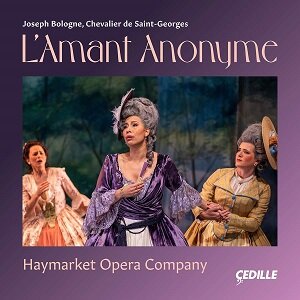
Joseph Bologne, Chevalier de Saint-Georges (1745-1799)
L’Amant Anonyme (1780)
Opéra comique in two acts
Léontine – Nicole Cabell (soprano)
Valcour – Geoffrey Agpalo (tenor)
Ophémon – David Govertsen (bass-baritone)
Jeannette – Erica Schuller (soprano)
Colin – Michael St Peter (tenor)
Dorothée – Nathalie Colas (soprano)
Haymarket Opera Orchestra/Craig Trompeter
rec. 2022; Sasha and Eugene Jarvis Opera Hall, DePaul University, Chicago, USA
French libretto with English translation
Cedille CDR90000217 [3 CDs: 169]
Although the pace of rediscovery of Joseph Bologne’s music has gathered momentum in recent years, it is only now that his single more or less complete surviving opera has been recorded. L’Amant Anonyme is a charming and well-written work, with some memorable vocal melodies and an attractive sequence of dances, though the narrative is largely inconsequential. The CD notes somewhat overstate the case to claim in the instance of one number – and by extension the whole work – that its ‘skilful compositional display becomes all the more impressive when one remembers that Bologne wrote L’Amant Anonyme ahead of all of Mozart’s ‘major’ operas’. Leaving aside the fact that Mozart would start composition on the first of that group of masterpieces (Idomeneo) within months of the premiere of Bologne’s work in March 1780, it is only because these ‘major’ operas range so far ahead in accomplishment beyond those by any other contemporary composers that listeners can overlook how advanced even Mozart’s earlier operas are. L’Amant Anonyme doesn’t have the symphonic complexity of La finta giardiniera (1775) or the extensively scored arias of La finta semplice (1769) – perhaps the most similar of Mozart’s early operas in subject to Bologne’s – but rather exemplifies the simpler, less affected musical setting of songs as in Bastien und Bastienne (1768).
The three movement Italianate Overture and essentially buffa Quintet finale to Act I are comparable to the operas of such composers as Cimarosa and Paisiello, especially in the spirited readings given to them here by the Haymarket Opera Company. But otherwise the generally syllabic settings of words in the arias is similar to the clarity of vocal expression pioneered by Gluck in the 1760s, and developed by him during the next decade in his French operas for Paris. La rencontre imprévue would therefore be a fairer, less formidable comparison with Bologne’s opera than any by Mozart, who never wrote for the French operatic stage in any case, though Bastien und Bastienne is based on a French play, parodies an opera by Rousseau and is influenced by French operatic style.
Insofar as the narrative of L’Amant Anonyme bears similarity with any of Mozart’s, the comic attempt by Valcour to break down Léontine’s emotional resistance by way of a supposed, concocted love triangle is somewhat like the ploy of Cosi fan tutte to make the sisters yield to their unknown suitors, even if the trick is slightly less cynical or turned to make such a drastic point about human nature. If his ultimate aim is essentially innocent, the means of Valcour’s ruse are perhaps not much less calculating than any of the individual stratagems deployed in the nearly contemporary novel Les Liaisons dangereuses. Having expressed his love for Léontine through anonymous letters and secret admiration – as the anonymous lover of the opera’s title – for fear of rejection if he had openly pressed his cause, Valcour now tries to force the issue. He comes to Léontine in his own person to discuss a letter she has received, and argues the case for and against the unknown lover. By ‘pretending’ to be the anonymous lover, it is eventually revealed to her that he and Valcour are one and the same.
In this work, which features nearly as much spoken dialogue as music, the singers approach the score with a conversational intimacy, lending sensitive vocal nuance to the setting. Nicole Cabell is a confident and effortlessly graceful Léontine, encompassing the role’s wide register with poise, up to the top Cs called for, and an impressively controlled agitated aria in Act One. Geoffrey Agpalo is a warm voiced Valcour, gently but persuasively insinuating the anonymous lover’s case to Léontine. David Govertsen is dependable as Valcour’s sidekick Ophémon, not least in his theatrical protestations on the unknown one’s behalf to Léontine in ‘Aimer sans pouvoir le dire’. Michael St. Peter and Erica Schuller provide an aptly guileless foil to the principal pair as the lovers Colin and Jeanette, countryfolk whose own marriage serves to stir Léontine’s feelings further into making a decision. Dorothée is just a speaking part such that Nathalie Colas only sings in the choruses in ensemble with the other singers.
Craig Trompeter leads the Haymarket Opera Orchestra in a sympathetic interpretation of the work’s varied movements – responsive to the shifts of expression in the vocal numbers, emphatic in the Quintet, and setting an atmospheric background to the searching minor-key Trio near the conclusion – and bringing the delicacy of a chamber ensemble to the sequence of dances. The third CD in this release gives the music of the opera alone, without the spoken dialogue in between as in the first two discs. The recording not only fills a gap in the catalogue but reveals a lively and well-crafted piece that will please all fans of 18th century opera.
Curtis Rogers
Help us financially by purchasing from





















